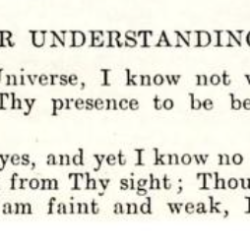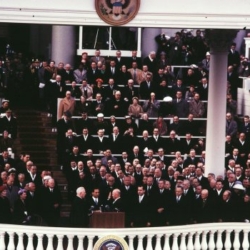| Contribute a translation | Source (English) |
|---|---|
Almighty God, Thou hast sent us into a world of mystery. Yet, hast Thou created in us a yearning for knowledge, a burning desire to know finalities. | |
Thou hast taught us to confess our own limits that we rely not upon our own understanding and say, “wisdom is ours.” | |
Realizing our own shortcomings, we incline our minds to the teachings of others. Conscious that a single life’s experience is but naught amidst the infinities of Thy mysterious world, we are respectful of the views of our fellow men who like ourselves grope for truth. | |
Teach us, therefore, O Lord, to keep our minds ever free from the clouds of haughtiness and self-deception, that we may not deny ourselves the opinions and teachings of others. | |
We are led by Thy mysteries to seek after Thee, O Eternal. All things that stretch beyond our imagination tell us that Thou, O Mystery of All Mysteries, art the end and the beginning of them all. In Thee we find the source of life and being, and from Thee cometh the glory and the beauty of the wondrous things about us. Though we cannot understand Thy being, we seek to feel Thy presence, to be drawn into Thy holiness. | |
Sanctify us, O God, consecrate our lives to Thee that in Thy light we may see light, in Thy life we may gain life everlasting, Amen. |
“[Prayer] For Knowledge and Understanding” by Rabbi Louis M. Epstein was published in Rabbi Morrison David Bial’s anthology, An Offering of Prayer (1962), p. 18, from where this prayer was transcribed. When exactly this prayer was first written is not known to us, but it had to be before Rabbi Epstein’s death in 1949. With its theme of the wondrous yet mysterious cosmos, I can’t help but think this prayer was composed in the context of the revelations of Albert Einstein and his widely shared view of the world in 1930. If you know more, please leave a comment or contact us.
Source(s)


“[Prayer] for Knowledge and Understanding, by Rabbi Louis M. Epstein” is shared through the Open Siddur Project with a Creative Commons Public Domain Dedication 1.0 Universal license.








Leave a Reply